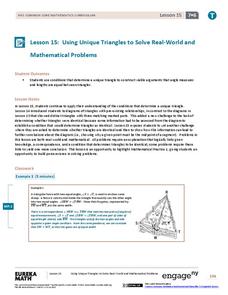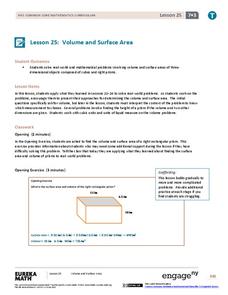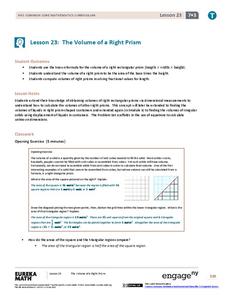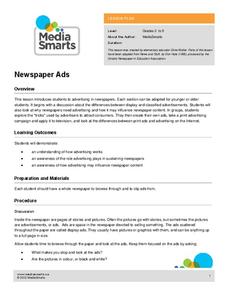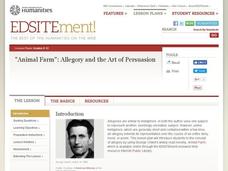EngageNY
Grade 12 ELA Module 1: Unit 1, Lesson 6
To prepare for drafting their Common Application narrative, class members return to the opening pages of The Autobiography of Malcolm X and examine how Haley engages and orients readers, establishes his narrator and point of view, and...
EngageNY
Grade 12 ELA Module 1: Unit 1, Lesson 3
Using questions they developed, class groups discuss Chapter 2 of Malcolm X's autobiography, focusing on the individuals and events Malcolm X feels contributed to his character development.
EngageNY
Grade 12 ELA Module 3
Gun, Germs, and Steel by Jared Diamond is a seminal work of historical nonfiction from the late 20th century. Use the author's claims and supporting evidence to guide your high school seniors through their research project, culminating...
EngageNY
Using Unique Triangles to Solve Real-World and Mathematical Problems
How can congruent triangles help mark a soccer field? This is just one question your classes can answer after solving the real-world problems in the lesson. Each example posed through a word problem elicits higher-order thinking and...
EngageNY
Volume and Surface Area
The 26th part of a 28-part series requires pupils to determine whether the answer to a problem requires surface area or volume. The class works problems about fish tanks that prompt individuals to decide, based on the question, which...
EngageNY
Surface Area II
The class makes the connection between finding the area of a right prism and a right pyramid in the 23rd installment in a series of 28. The pupils find the surface area of figures created by stacked cubes and prisms with cutouts.
EngageNY
The Volume of a Right Prism
Does the volume formula work even if the measurements are not whole numbers? Class members work simple problems to find that the formula (area of the base) × (height) works for all prisms, independent of measurements and shape.
EngageNY
Applying the Properties of Operations to Multiply and Divide Rational Numbers
Use properties to evaluate several multiplications and divisions. The 16th lesson in a series of 25 demonstrates to scholars how they can utilize properties of operations to evaluate complex numerical expressions involving multiplication...
EngageNY
Understanding Multiplication of Integers
Repeated addition also works for multiplying integers. The lesson plan has the class play the integer game again, but has one card multiplied several times. Scholars write the multiplication expression and the addition expression that...
EngageNY
Relating Scale Drawings to Ratios and Rates
Enlargements and reductions are all about scale. The lesson introduces scale drawing to the class. Pupils determine whether the drawing is a reduction or an enlargement, and the constant of proportionality between the original and the...
EngageNY
Ratios of Fractions and Their Unit Rates
Challenge the class to calculate unit rates using complex fractions. Pupils work through examples of finding unit rates using ratios of fractions. To complete the 11th lesson plan of 22, scholars review sample work and determine whether...
EngageNY
Unit Rate as the Constant of Proportionality
What do unit rates and constants of proportionality have in common? The lesson plan addresses this question and introduces the concept of constant proportionality to the class. Individuals find that the unit rate and the constant of...
National Endowment for the Humanities
Edgar Allan Poe, Ambrose Bierce, and the Unreliable Narrator
Stories by Edgar Allan Poe and Ambrose Bierce provide readers with an opportunity to investigate unreliable narrators. The lesson plan begins with an activity about different types of point of view and continues as scholars apply their...
Benjamin Franklin Tercentenary
The Junto Meets Again
Out of the classroom and into the streets! With Ben Franklin’s Junto society as inspiration, learners develop their ideas for improving their communities and put them into action. After analyzing meeting notes to discover what the Junto...
Institute of Electrical and Electronics Engineers
Build Your Own Robot Arm
Engineers team up to design and construct an 18-inch-long robotic arm that can successfully pick up a paper cup. Each group is given the exact same set of materials, but it is up to them to decide what to use and how to use it. It is a...
Institute of Electrical and Electronics Engineers
Build a Big Wheel
What does it take to prepare for a construction project? In an engineering lesson plan, youngsters examine how a Ferris wheel can turn and carry a load without falling apart. After reading up on big wheel designs, they create a model...
National Wildlife Federation
Massive Migrations: Grades K-8
Migratory animals follow the same path every year. Learners research the path of an assigned species and create a map highlighting key landmarks along the way. As a group, they come up with a presentation to share with their class.
United Nations
Compost Monitor Training
What should go in the trash, and what can be composted? Guide your young conservationists through the process of composing their trash with a lesson about the different ways we can dispose of garbage. Using a trash bag with clean...
Super Teacher Worksheets
I Have...Who Has...Multiplication Game
Get the whole class involved in practicing their multiplication facts with this fun collaborative activity. With each child given a card containing both a product and an unrelated multiplication sentence, the activity begins as...
Media Smarts
Newspaper Ads
Just how free is the press? After examining the advertising and propaganda techniques used by advertisers, class members consider the influence advertisers may exert over newspaper content.
Media Smarts
Thinking About Television and Movies
As part of their study of the influence of TV and films, class members consider how music, lighting, costumes, camera angles, etc. are used to influence the response of viewers.
Center for Civic Education
Lesson 3: Becoming a Voter
Who is eligible to vote in your state? Class members examine their states' voting qualifications, complete sample voter registration forms, and chart the elections scheduled.
National Endowment for the Humanities
Animal Farm: Allegory and the Art of Persuasion
Introduce your class members to allegory and propaganda with a series of activities designed to accompany a study of George Orwell's Animal Farm. Readers examine the text as an allegory, consider the parallels to collective farms...
BioEd Online
Butterflies in Space
How does gravity affect the life cycle of a butterfly? Learn first-hand what types of investigations astronauts perform in space by following along with one of NASA's experiments. Create butterfly habitats in the classroom with specific...
Other popular searches
- Taxonomy
- Classical Music
- Bloom's Taxonomy
- Using Taxonomy
- Blooms Taxonomy
- Technology in the Classroom
- Classifications
- Classroom Management
- Math Classification
- Animal Classifications
- Classifying Triangles
- Classify



